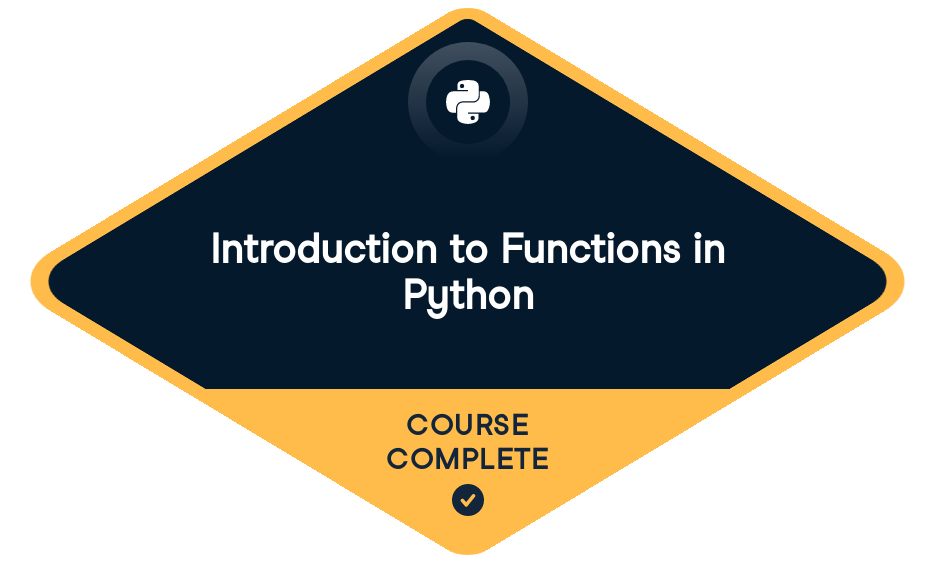Napoleon-Christos Oikonomou has completed
Introduction to Functions in Python
Start course For Free3 hr
3,550 XP

Loved by learners at thousands of companies
Course Description
It's time to push forward and develop your Python chops even further. Python has tons of fantastic functions and a module ecosystem. However, as a data professional or developer, you'll constantly need to write your own functions to solve problems that are dictated by your data. You will learn the art of function writing in this first course. You'll come out of this course being able to write your very own custom functions, complete with multiple parameters and multiple return values, along with default arguments and variable-length arguments. You'll gain insight into scoping in Python, be able to write lambda functions and handle errors in your function writing practice. You'll wrap up each chapter by using your new skills to write functions that analyze Twitter data.The videos contain live transcripts you can reveal by clicking "Show transcript" at the bottom left of the videos.
The course glossary can be found on the right in the resources section.
To obtain CPE credits you need to complete the course and reach a score of 70% on the qualified assessment. You can navigate to the assessment by clicking on the CPE credits callout on the right.
Training 2 or more people?
Get your team access to the full DataCamp platform, including all the features.- 1
Writing your own functions
FreeYou'll learn how to write simple functions, as well as functions that accept multiple arguments and return multiple values. You'll also have the opportunity to apply these new skills to questions commonly encountered by data professionals and developers.
User-defined functions50 xpStrings in Python50 xpRecapping built-in functions50 xpWrite a simple function100 xpSingle-parameter functions100 xpFunctions that return single values100 xpMultiple parameters and return values50 xpFunctions with multiple parameters100 xpA brief introduction to tuples100 xpFunctions that return multiple values100 xpBringing it all together50 xpBringing it all together (1)100 xpBringing it all together (2)100 xp - 2
Default arguments, variable-length arguments and scope
You'll learn to write functions with default arguments so that the user doesn't always need to specify them, and variable-length arguments so they can pass an arbitrary number of arguments on to your functions. You'll also learn about the essential concept of scope.
Scope and user-defined functions50 xpPop quiz on understanding scope50 xpThe keyword global100 xpPython's built-in scope50 xpNested functions50 xpNested Functions I100 xpNested Functions II100 xpThe keyword nonlocal and nested functions100 xpDefault and flexible arguments50 xpFunctions with one default argument100 xpFunctions with multiple default arguments100 xpFunctions with variable-length arguments (*args)100 xpFunctions with variable-length keyword arguments (**kwargs)100 xpBringing it all together50 xpBringing it all together (1)100 xpBringing it all together (2)100 xp - 3
Lambda functions and error-handling
Learn about lambda functions, which allow you to write functions quickly and on the fly. You'll also practice handling errors in your functions, which is an essential skill. Then, apply your new skills to answer data science questions.
Lambda functions50 xpPop quiz on lambda functions50 xpWriting a lambda function you already know100 xpMap() and lambda functions100 xpFilter() and lambda functions100 xpReduce() and lambda functions100 xpIntroduction to error handling50 xpPop quiz about errors50 xpError handling with try-except100 xpError handling by raising an error100 xpBringing it all together50 xpBringing it all together (1)100 xpBringing it all together (2)100 xpBringing it all together (3)100 xpBringing it all together: testing your error handling skills50 xp
Training 2 or more people?
Get your team access to the full DataCamp platform, including all the features.Data Scientist
Hugo is a data scientist, educator, writer and podcaster formerly at DataCamp. His main interests are promoting data & AI literacy, helping to spread data skills through organizations and society and doing amateur stand up comedy in NYC. If you want to know what he likes to talk about, definitely check out DataFramed, the DataCamp podcast, which he hosted and produced.
Join over 18 million learners and start Introduction to Functions in Python today!
Create Your Free Account
or
By continuing, you accept our Terms of Use, our Privacy Policy and that your data is stored in the USA.